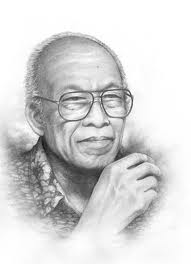This Earth of Mankind: Difference between revisions
No edit summary |
|||
| Line 1: | Line 1: | ||
====Date: [[:Category: | ====Date: [[:Category:1981|1981]]==== | ||
====Region: [[:Category:Asia|Asia | ====Region: [[:Category:Asia|Asia]]==== | ||
====Subject: [[:Category:Political/Economic/Social Opinion|Political/Economic/Social Opinion | ====Subject: [[:Category:Political/Economic/Social Opinion|Political/Economic/Social Opinion]]==== | ||
====Medium: [[:Category:Literature|Literature | ====Medium: [[:Category:Literature|Literature]]==== | ||
---- | ---- | ||
'''Artist:''' Pramoedya Ananta Toer | [[File:Toer.jpg|left]] | ||
'''Artist:''' Pramoedya Ananta Toer (1925 - 2006) | |||
'''Confronting Bodies:''' Indonesian Government | '''Confronting Bodies:''' Indonesian Government | ||
''' | '''Date of Action:''' September, 1981 | ||
'''Location:''' Jakarta, Indonesia | '''Location:''' Jakarta, Indonesia | ||
'''Description of Artwork:''' The novel, This Earth of Mankind, was orally composed by Pramoedya Ananta Toer while he was a political prisoner on Buru Island in eastern Indonesia. The novel tells the story of a young Javanese writer's struggle against Dutch Colonial oppression in the 1890's. As explained by the novel's translator, Max Lane, "... | '''Description of Artwork:''' The novel, ''This Earth of Mankind'', was orally composed by Pramoedya Ananta Toer while he was a political prisoner on Buru Island in eastern Indonesia from 1965 - 1979. The novel tells the story of a young Javanese writer's struggle against Dutch Colonial oppression in the 1890's. As explained by the novel's translator, Max Lane, "...In one scene in the book... The writer, Mingke, is forced to walk on his knees to see the local official, who turns out to be his father. Mingke's reaction is, 'What is the reason you created customs that would so humiliate your own decendents?' Lane goes on to comment, "What Pramoedya is saying to modern day Indonesians is that they should not crawl on in front of authority figures..." (Tom Krausse, "Indonesia's Banned Bestseller", World Press Review, August 1982, pg. 59) | ||
'''The Incident:''' "Max Lane was sent home from his Australian diplomatic post for translating what has been described as the best, most beautiful novel in the history of modern Indonesian literature. He was recalled from Jakarta | '''The Incident:''' "Max Lane was sent home from his Australian diplomatic post for translating what has been described as the best, most beautiful novel in the history of modern Indonesian literature. He was recalled from Jakarta September of 1981 for translating what was the bestselling novel of its time until banned by the Indonesian Government (of Suharto)..." (Tom Krausse, "Indonesia's Banned Bestseller", World Press Review, August 1982, pg. 59) | ||
'''Results of Incident:''' Joesoef Isak, one of the publishers of This Earth of Mankind , was jailed in October of 1981 and following his release was forced to report three times a week to the local military. Pramoedya Ananta Toer was imprisoned for the publication and later released, and | '''Results of Incident:''' Joesoef Isak, one of the publishers of This Earth of Mankind , was jailed in October of 1981 and following his release was forced to report three times a week to the local military. Pramoedya Ananta Toer was imprisoned for the publication and later released, and lived under house arrest from 1980 - 1992, reporting weekly to the military. Max Lane was recalled from Jakarta and began working full time on translating the works of Pramoedya Ananta Toer. | ||
'''Source:''' Tom Krausse, "Indonesia's Banned Bestseller", World Press Review, August 1982, pg. 59 | '''Source:''' Tom Krausse, "Indonesia's Banned Bestseller", World Press Review, August 1982, pg. 59; NY Times obituary | ||
[[Category: | [[Category:1981]] | ||
[[Category:]] | [[Category:1980s]] | ||
[[Category:]] | [[Category:20th century]] | ||
[[Category:Asia]] | [[Category:Asia]] | ||
[[Category:Political/Economic/Social Opinion]] | [[Category:Political/Economic/Social Opinion]] | ||
[[Category:Literature]] | [[Category:Literature]] | ||
[[Category:Pramoedya Ananta Toer, author]] | [[Category:Pramoedya Ananta Toer, author]] | ||
{{DISPLAYTITLE:<span style="font-style: italic;">This Earth of Mankind</span>}} | |||
__NOTOC__ | __NOTOC__ | ||
Revision as of 01:26, 8 January 2012
Date: 1981
Region: Asia
Subject: Political/Economic/Social Opinion
Medium: Literature
Artist: Pramoedya Ananta Toer (1925 - 2006)
Confronting Bodies: Indonesian Government
Date of Action: September, 1981
Location: Jakarta, Indonesia
Description of Artwork: The novel, This Earth of Mankind, was orally composed by Pramoedya Ananta Toer while he was a political prisoner on Buru Island in eastern Indonesia from 1965 - 1979. The novel tells the story of a young Javanese writer's struggle against Dutch Colonial oppression in the 1890's. As explained by the novel's translator, Max Lane, "...In one scene in the book... The writer, Mingke, is forced to walk on his knees to see the local official, who turns out to be his father. Mingke's reaction is, 'What is the reason you created customs that would so humiliate your own decendents?' Lane goes on to comment, "What Pramoedya is saying to modern day Indonesians is that they should not crawl on in front of authority figures..." (Tom Krausse, "Indonesia's Banned Bestseller", World Press Review, August 1982, pg. 59)
The Incident: "Max Lane was sent home from his Australian diplomatic post for translating what has been described as the best, most beautiful novel in the history of modern Indonesian literature. He was recalled from Jakarta September of 1981 for translating what was the bestselling novel of its time until banned by the Indonesian Government (of Suharto)..." (Tom Krausse, "Indonesia's Banned Bestseller", World Press Review, August 1982, pg. 59)
Results of Incident: Joesoef Isak, one of the publishers of This Earth of Mankind , was jailed in October of 1981 and following his release was forced to report three times a week to the local military. Pramoedya Ananta Toer was imprisoned for the publication and later released, and lived under house arrest from 1980 - 1992, reporting weekly to the military. Max Lane was recalled from Jakarta and began working full time on translating the works of Pramoedya Ananta Toer.
Source: Tom Krausse, "Indonesia's Banned Bestseller", World Press Review, August 1982, pg. 59; NY Times obituary
